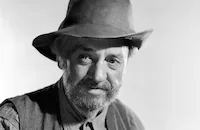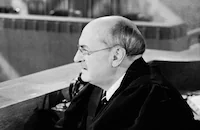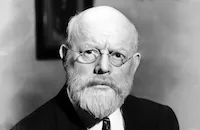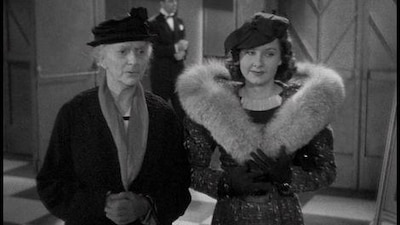Make Way for Tomorrow

Brief Synopsis
Cast & Crew
Leo Mccarey
Victor Moore
Beulah Bondi
Fay Bainter
Thomas Mitchell
Porter Hall
Film Details
Technical Specs

Synopsis
Four of the five children of septuagenarian couple Barkley and Lucy Cooper gather to learn that their parents have lost their house. Expecting the children will soon find them a permanent home, Barkley and Lucy each go to live with a different child. Lucy unwittingly disrupts the home life of her well-meaning son George and his wife Anita by interfering with Anita's career as a bridge teacher and causing George and Anita's reckless daughter Rhoda to stop bringing her male friends home. When Rhoda's promiscuity leads the family to the brink of scandal, Anita convinces George to investigate the possibility of putting Lucy in a home for the aged, as efforts to unite Barkley and Lucy in the home of daughter Nellie Chase have foundered on the resistance of Nellie's husband. Three hundred miles away, Barkley's presence has so distressed his mean-spirited daughter Cora that she distorts a doctor's report to convince the family that Barkley must live in California with his daughter Addie. Resigning herself to permanent separation from Barkley, Lucy agrees to enter a home for the aged. The couple spends five joyous hours together in the city before the train to California separates husband and wife forever.

Director

Leo Mccarey
Cast

Victor Moore

Beulah Bondi

Fay Bainter

Thomas Mitchell

Porter Hall
Barbara Read
Maurice Moscovitch

Elisabeth Risdon

Minna Gombell
Ray Mayer
Ralph Remley

Louise Beavers

Louis Jean Heydt
Gene Morgan
George Offerman Jr.
Tommy Bupp
Ferike Boros
Nick Lukats
Terry Ray

Gene Lockhart
Ruth Warren
Dell Henderson
Paul Stanton

Granville Bates

Byron Foulger
Avril Cameron
Lelah Tyler
Bernard Suss
Helen Dickson
Mitchell Ingraham
Gloria Williams
Kitty Mchugh
Ralph Brooks
Bobby Caldwell
Ethel Clayton
Ralph Lewis

Phillips Smalley

Howard Mitchell
William Newell
Ben Franklin Gibson
Francis Sayles
Louise Seidel
Louis Natheaux
Joe North
Dorothy Lloyd
Lee Millar
Don Mckinney
Sydney De Grey
John Preston
Bill Begg
Rosemary Theby
Fritzi Brunette
Helen Davis
Jeanne Beeks
Richard R. Neill
Alice Keating
Don Brodie
Jesse A. Graves
Crew
George Antheil
Sam Coslow
Viña Delmar
Hans Dreier
A. E. Freudeman
Bernard Herzbrun
Gordon Jennings
Don Johnson
William Lebaron
Leo Mccarey
William C. Mellor
Boris Morros
Walter Oberst
Leo Robin
Jean Schwartz
Harry Scott
Leroy Stone
Victor Young
Adolph Zukor

Videos
Movie Clip



Trailer
Film Details
Technical Specs

Articles
Make Way for Tomorrow
The subject of all this praise and pride? Make Way for Tomorrow (1937), a picture high indeed on the list of Hollywood classics esteemed by filmmakers and loved by ardent movie fans lucky to have seen it, yet virtually unknown to anyone else. It's arguably one of the most unjustly forgotten pictures ever to come out of the studio system.
The movie is about a sweet, elderly couple (Victor Moore and Beulah Bondi) who lose their home to a bank foreclosure and are forced to move in with their grown children. No one child has room for them both, however, so two of the five children, living 300 miles apart, each take one parent. Moore and Bondi split up -- temporarily, everyone agrees. But the children's own lives, spouses, kids and selfish attitudes slowly turn the parents' presence into a burden, and eventually there is talk of old-age homes and distant trips.
The subject of old age and its effect upon the parent-child relationship is an uncomfortable and unsettling subject for many people. It's also a universal one, and why Make Way for Tomorrow strikes a deep chord with so many who see it. Few other American films have dealt with this topic, and Make Way for Tomorrow is probably the best of the bunch because of its honesty and lack of manipulative stickiness. It portrays the realities of dealing with aging parents -- the responsibility, the inconvenience, the duty, the guilt -- with tremendous humanity, heartbreak and even humor. McCarey once said, "it was the saddest story I ever shot; at the same time very funny. It's difficult for me to talk about, but I think it was very beautiful."
As film historian Tag Gallagher has pointed out, part of McCarey's brilliance here is in making the audience complicit in the children's reactions to the parents. The children feel annoyed and burdened; McCarey makes us feel the same way until a masterfully directed moment during a bridge class, of all things, which causes us to share the children's sudden guilty feelings.
By the last act of this story, our subjective alignment is firmly with Bondi and Moore, which is essential to making the film's final 26 minutes one of the most moving extended sequences in American cinema. Events culminate in a magnificent ending that stays true to what has come before -- and which cost Leo McCarey his contract at Paramount.
Make Way for Tomorrow is based on a 1934 novel called Years Are So Long by Josephine Lawrence and an unpublished play based on that novel, by Helen and Nolan Leary. The screenplay is by Vina Delmar. But the real inspiration for the picture came from a much more personal place: the death of Leo McCarey's father. McCarey made this picture immediately afterwards as a way to honor his father and his parents' entire generation.
McCarey is a director whose visual style is difficult to pin down; he tended to compose his films rather straightforwardly. Perhaps his most notable trait, aside from his unquestioned expertise in comedy timing honed during countless Laurel and Hardy and Charley Chase shorts, is his ability to mix drama and comedy scenes effectively -- one of the most difficult tasks in directing.
In an interview with The Hollywood Reporter, McCarey said, "This picture was certainly a heart-tugger, but the thing that made it great, I think, was the subtle comedy that Victor Moore, Beulah Bondi and others in the cast were able to inject into their performance."
Bondi and Moore are indeed tremendous here. Ironically, it's their presence in the lead roles that also has contributed to the movie becoming so forgotten. Bondi was a character actress who played mothers and grandmothers in countless films, including Ma Bailey in It's a Wonderful Life (1946). (She played James Stewart's mother four times on screen.) Make Way for Tomorrow features her greatest role and performance, making it ironic that she was nominated for a Best Supporting Actress Oscar in 1936 and 1938, but not for this film in 1937. Amazingly, Bondi was only 48 when she made this -- just four years older than Thomas Mitchell, who plays her son.
61-year-old Victor Moore was known as a vaudeville comedian and most often appeared in comedies and musicals, but this screen role, in which he was cast against type, was his favorite. He later wrote, "The theme made a deep impression on us... We became so absorbed in our parts that we never knew or cared when quitting time came. I felt my role so keenly that sometimes I couldn't prevent tears from coming to my eyes. 'Barkley mustn't feel sorry for himself,' Leo would say. 'Let the audience do the crying.' The extras, grips, cameramen and propmen were so moved that several of them told Beulah Bondi...that they had just written long-delayed letters to their parents. One old lady, after hanging up the extras' clothes on a line, said to me, 'You and Beulah are acting this story. I'm living it.'"
Moore also said that studio chief Adolph Zukor was on set for much of the production, trying to convince McCarey to add a happy ending. But McCarey was steadfast and refused to budge. True to Paramount's concerns, Make Way for Tomorrow was a box-office flop despite strong reviews. It's very possible that the studio purposefully didn't promote the film properly due to McCarey's refusal to be a team player. (Opening the film just before Mother's Day was probably not the best timing.) Be that as it may, McCarey was immediately cut loose from Paramount.
He got the last laugh, however, by signing with Columbia and quickly making The Awful Truth, one of the best screwball comedies of all time. It not only became the top-grossing film of the year but earned McCarey an Academy Award nomination for Best Director. When McCarey won the award, he stepped up to the podium, thanked the Academy, and said that they had given him the award "for the wrong picture."
Producer: Leo McCarey, Adolph Zukor (producer)
Director: Leo McCarey
Screenplay: Viña Delmar (writer); Josephine Lawrence (novel "The Years Are So Long"); Helen Leary, Nolan Leary (play)
Cinematography: William C. Mellor
Art Direction: Hans Dreier, Bernard Herzbrun
Music: George Antheil, Victor Young
Film Editing: LeRoy Stone
Cast: Victor Moore (Barkley 'Pa' Cooper), Beulah Bondi (Lucy 'Ma' Cooper), Fay Bainter (Anita Cooper), Thomas Mitchell (George Cooper), Porter Hall (Harvey Chase), Barbara Read (Rhoda Cooper), Maurice Moscovitch (Max Rubens), Elisabeth Risdon (Cora Payne), Minna Gombell (Nellie Chase), Ray Mayer (Robert Cooper).
BW-91m. Letterboxed. Closed Captioning. Descriptive Video.
by Jeremy Arnold
Sources:
Peter Bogdanovich, Who the Devil Made It
Tag Gallagher, Criterion-edition DVD liner notes
Wes D. Gehring, Leo McCarey: From Marx to McCarthy
Bertrand Tavernier, Criterion-edition DVD liner notes

Make Way for Tomorrow
Make Way for Tomorrow - Leo McCarey's MAKE WAY FOR TOMORROW on DVD from The Criterion Collection
The story is simple enough. When the bank repossesses the house of elderly Bark and Lucy Cooper (Victor Moore & Beulah Bondi), their middle-aged children avoid dealing with the problem. George, the most responsible son (Thomas Mitchell) takes in Ma while resentful daughter Cora (Elisabeth Risdon) houses Pa. The plan is for the better-off daughter Nellie (Minna Gombell) to eventually take in both parents. Bark and Lucy don't fare well without each other. Cora resents Bark's fussing and is rude to his new friend, the local merchant Max (Maurice Moscovitch). Lucy innocently interferes in George's household, causing friction between his wife Anita (Fay Bainter) and their daughter Rhoda (Barbara Read). Then Nellie's husband Harvey (Porter Hall) refuses to take in either parent, so it becomes evident that Bark and Lucy will have to separate permanently. Cora uses a medical excuse to suggest that Bark be sent to another daughter out in California. George looks into an old folk's home for Lucy. After a fifty-year marriage, the old folks are left in Manhattan with just five hours together before Bark's train leaves.
Leo McCarey began his career directing Hollywood's most famous comedians: Laurel & Hardy, Charley Chase, The Marx Brothers, Mae West. He made what may be the best screwball comedy (The Awful Truth) and found his forté in romantic comedy-dramas like Love Affair and Going My Way. Hailed as a master of improvisation, a skill he learned from years of silent comedy work, McCarey placed character insight and natural performances above camera tricks. The famed Jean Renoir was famously quoted as saying that no American director understood people as well. Although Make Way for Tomorrow's failure lost McCarey his contract at Paramount, he always considered it his best film.
Viña Delmar's script softens the original book and play yet is relentless in its observation of family dynamics. McCarey doesn't separate his characters into heroes and villains by making the "old folks" kindly innocents victimized by unthinking relatives. Dealing with the parents isn't always easy. Old Bark knows he's not welcome in Cora's house and becomes uncooperative. Lucy disrupts Alice's bridge lessons, puts a strain on the duties of the maid (Louise Beavers) and contributes unintentionally to problems with daughter Rhoda. The problem is everyone's fault and no one's; there just seems no place for Bark and Lucy to be together. Even the understanding George and Alice are eventually compelled to take steps to remove mother from the house.
Make Way for Tomorrow does not show its age in the slightest. After an opening title card makes mention of a "generation gap", the movie demonstrates the truth we all know, that older relatives can easily be resented as an inconvenience. The movie abounds in awkward moments of family embarrassment and thoughtless bad manners. Events that in an ordinary movie would be crucial are only alluded to, as when daughter Rhoda's involvement with an older man ends in talk of her name "being kept out of the case". McCarey is also sensitive to issues often sentimentalized or ignored in 1930s movies. The Coopers' black maid is an employee with rights and needs of her own. When the Jewish merchant Max pays a visit to his friend Bark's sickbed, Cora slams the door in his face, dismissing his wife's chicken soup in a way that smacks of anti-Semitism.
Although Leo McCarey doesn't blunt the reality of the situation, he allows the old couple (and us) a last-reel grace period. Left to spend their final afternoon together in the city, Bark and Lucy enjoy an idyllic last date, vaguely reminiscent of the "trip to the city" in Murnau's silent classic Sunrise. The discomfort of their guilty children is forgotten when they visit the hotel where they spent their honeymoon fifty years before. The hatcheck girl is gracious and the manager treats them to the hospitality of the hotel. Lucy has a drink, but only after seeing that other women are drinking in public now. For a couple of hours Bark and Lucy are able to communicate as sweethearts once more. What follows is one of the most touching farewells in the movies.
For such an emotional subject, no tears are shed. Make Way for Tomorrow addresses the hard truth of old age without playing the tragedy game, and its heartbreak is honestly earned. We are told that Paramount chief Adolph Zukor pleaded with Leo McCarey to relent and allow his ill-fated couple to stay together, but the director had too much integrity to undercut the story. At this point in his career McCarey was so consistently successful that a "flop" of this caliber only added to his prestige.
The movie demonstrates the talent of character actress Beulah Bondi, who gives one of the best and most understated performances of the 1930s. Also earning our respect is actor Thomas Mitchell as the only relative willing to assume responsibility for his parents. In a tellingly painful moment, Lucy spares her son the pain of turning her out by making an announcement of her own. The sense of sacrifice involved has an almost Biblical quality, played out in a humble everyday setting.
Criterion's Make Way for Tomorrow is licensed from Universal, the holders of most pre-1948 Paramount titles. The B&W transfer was made from elements in excellent condition. The clear image allows us to admire the impressive makeup work on actors Moore and Bondi. Beulah Bondi wasn't yet fifty, and the illusion of old age is remarkable.
The disc extras are particularly good. An insert booklet contains three insightful essays. Bertrand Tavernier writes about discovering the film later in France. An excerpt from Robin Wood analyzes Make Way for Tomorrow's final date scene as an act of "un-marrying" between two adults facing the end of their relationship. Critic Tad Gallagher's appreciation of Leo McCarey's deceptively unforced direction uses telling frame grabs to illustrate subtle, relevant meanings in the images.
Two new interviews are included as well. Critic Gary Giddens examines Make Way for Tomorrow in the context of the 1930s, when Social Security had just been adopted. He also explains director McCarey's relationship to the HUAC committee hearings and the problems of his later career. Peter Bogdanovich relates anecdotes told him by greats like Howard Hawks and Orson Welles, assembling a warm picture of McCarey as one of Hollywood's most respected talents.
The extras inadvertently bring up an inconsistency. Essayist Tag Gallagher identifies Make Way for Tomorrow screenwriter Viña Delmar as a pen name for a male screenwriter, Eugene Delmar. Peter Bogdanovich relates a story about an attractive woman catching Leo McCarey's eye at a nightspot; McCarey subsequently interviewed Ms. Delmar sight unseen and was surprised to discover it was the same person. Other sources identify the Delmars as a married couple who worked together on scripts. Her birth name was Alvina Croter, which might explain the odd Spanish pen name. However, when Eugene died in 1956 Ms. Delmar stopped writing.
For more information about Make Way for Tomorrow, visit The Criterion Collection. To order Make Way for Tomorrow, go to TCM Shopping.
by Glenn Erickson
Make Way for Tomorrow - Leo McCarey's MAKE WAY FOR TOMORROW on DVD from The Criterion Collection
Quotes
Two old-fashioneds, for two old-fashioned people.- Pa
Trivia
Notes
A news item in Hollywood Reporter on December 9, 1936 states that director Leo McCarey and Howard J. Green were polishing the script with the intent of making the story less grim; at that point, the film was called Years Are So Long. Due to the re-writes and McCarey's illness, the starting date for the film was pushed back from December 14, 1936 to January 11, 1937. On January 7, 1937, Hollywood Reporter reported that Fay Bainter was taking the role originally slated for Aline MacMahon. Hollywood Reporter announced on February 5, 1937 that background shots were being filmed in New York's Central Park. According to a news item in Hollywood Reporter on March 2, 1937, McCarey started shooting cafe scenes on 1 Mar. According to a news item in Hollywood Reporter on April 24, 1937, Paramount decided to exhibit the film on a roadshow basis, releasing it in key U.S. cities before its general release; Motion Picture Herald release charts give a release date of April 30, 1937, but this date May refer to key cities. The New York premiere of the film was stalled until the eve of Mother's Day. The Call Bureau Cast Service and Motion Picture Herald's "In the Cutting Room" list Margaret Hamilton as "Nellie Chase" and Charlie Arnt as "Robert Cooper," although they were later replaced. According to Motion Picture Herald, a question-and-answer survey was conducted in Newark, NJ, in which thousands replied with problems regarding care of aged parents.















